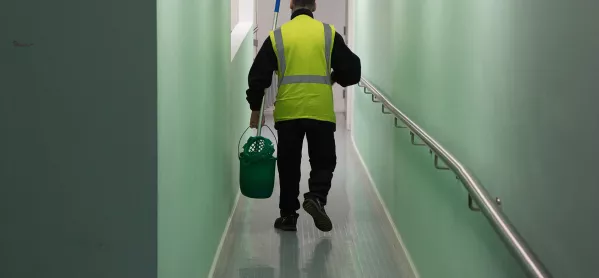A headteacher has revealed that he has been forced to work as his school’s caretaker and technician because funding pressures have left him unable to replace departing staff.
Iain Linsdell, headteacher of Poplar Street Primary School, in Tameside, Greater Manchester, told a summit meeting on school funding that “it has become a sick joke that I know more about my school’s drainage than I do about pupils’ progress.”
WATCH: Iain Linsdell speak out about carrying out caretaker duties:
Mr Linsdell said he had decided to step in to fill vacancies as both caretaker and technician because the pressure on school finances were so tight.
He said: “I couldn’t replace the technician because I simply can’t afford it anymore. I’ve also taken on some of the caretaker duties when our most recent caretaker retired.
“It was more straightforward for me to support one of my cleaning staff in helping with the caretaking duties and take on some of those repair and maintenance jobs myself.”
Mr Linsdell was speaking at the North West Education Summit, organised by the NAHT heads’ union.
The summit aimed to give school leaders an opportunity to set out the impact that stretched budgets are having on their schools.
‘This school funding crisis is real’
Clem Coady, the headteacher of Stoneraise School in Cumbria, told the event he had done maintenance work at his school because of budget pressures.
He said: “We have had to let class sizes increase because of staff cuts. My daughter is in a class of 34. I know she would receive a better education in a smaller class but, unfortunately, we simply cannot afford to do this.
“Staffing costs now represent 95 per cent of my budget and I don’t know what we are going to do next.”
The event also heard from a Year 9 pupil, who said that she was having to wait to see if she could take the GCSE courses she wanted because the school did not yet know whether it would be able to run all of the subjects she had chosen.
According to the School Cuts website, schools across the North West will see a real-terms funding cut of £192 million by 2020.
NAHT general secretary Paul Whiteman said: “The good thing about an event like this is that it is authentic. This is not just us lobbying from the centre. You know when you hear from members directly that they are hurting because of funding cuts.
“And when you hear, as we have today, that a Year 9 pupil doesn’t know yet whether she will be able to take the subjects she has chosen for GCSE because the school’s budget could mean they won’t be able to run these courses then you know this crisis is real - no matter what the government says about increasing school funding.”
Lucy Powell MP, a former shadow education secretary and a member of the Commons Education Select Committee, highlighted the length of time it would take for the full impact of school funding cuts to be felt. “The problem with any area of public policy is that it can take four or five years before the impact is seen,” she said.
However, she added that the inquiry into schools funding, which has been launched by the Education Select Committee, will publish its findings before the next Comprehensive Spending Review in an attempt to influence future government spending decisions.
Before the event, the Department for Education said: “There are no cuts in funding and over the next two years every school will attract an increase in funding through our fairer formula.
“By 2020, core school funding will rise to a record £43.5 billion - the highest ever and 50 per cent more per pupil in real terms than in 2000.”




